
- Home
- Author
- Adam Blade (15)
- Agatha Christie (20)
- Charles Dickens (22)
- Colin Dexter (16)
- Colleen Hoover (25)
- Eiichiro Oda (21)
- Enid Blyton (14)
- Herge (31)
- Ian Fleming (85)
- J.k. Rowling (219)
- Liz Pichon (11)
- Mixed Authors (47)
- Roald Dahl (13)
- Robert Jordan (16)
- Roger Hargreaves (19)
- Sarah J. Maas (17)
- Suzanne Collins (16)
- Tite Kubo (19)
- Unknown (29)
- Various (82)
- ... (2725)
- Book Series
- Batman (5)
- Beast Quest (7)
- Collection (18)
- Diary Of A Wimpy Kid (7)
- Discworld (8)
- Fighting Fantasy (10)
- Fullmetal Alchemist (7)
- Goosebumps (5)
- Harry Potter (167)
- Historical (16)
- Inspector Morse (16)
- James Bond (34)
- James Bond 007 (27)
- Peter Rabbit (6)
- Pokémon (5)
- The Hunger Games (13)
- Throne Of Glass (6)
- Twilight (6)
- Various (9)
- Winnie The Pooh (7)
- ... (3083)
- Book Title
- A Game Of Thrones (7)
- Antique Book (12)
- Broken Stars (7)
- Collection (20)
- Default Title (5)
- Fighting Fantasy (6)
- Fullmetal Alchemist (6)
- Harry Potter (67)
- Heartland Series (4)
- Inspector Morse (16)
- James Bond (29)
- Pokemon Tales (5)
- See Listing (31)
- Set Collection (8)
- The Bible (4)
- Throne Of Glass (5)
- Tintin (7)
- Tofollow (6)
- Twilight Saga (6)
- Various (31)
- ... (3180)
- Format
- Audio Cd (6)
- Board Book (4)
- Book (14)
- Books (55)
- Box Set (183)
- Combo (11)
- Dvd (11)
- Flexi Bound (13)
- Hardback (75)
- Hardcover (452)
- Mixed Lot (12)
- Mixed Media (76)
- Multiple Copy Pack (9)
- Paperback (784)
- Quantity Pack (5)
- Set (8)
- Single Issue (8)
- Softcover (42)
- Softcover Box Set (8)
- Trade Paperback (25)
- ... (1661)
- Narrative Type
- Publisher
- Black Library (19)
- Bloomsbury (76)
- Dc Comics (18)
- Egmont (33)
- Hachette (26)
- Harpercollins (54)
- Heron Books (14)
- Marvel (19)
- Marvel Comics (18)
- Orbit (18)
- Pan Books (17)
- Penguin (61)
- Penguin Books (15)
- Scholastic (60)
- Shueisha (17)
- The Folio Society (30)
- Vintage (26)
- Vintage Books (15)
- Viz Media (57)
- Viz Media Llc (31)
- ... (2838)
Rare SET OF 8 ANTIQUE BOOKS / ROYAL STATISTICAL SOCIETY COLLECTION See Details

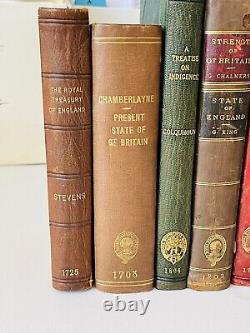
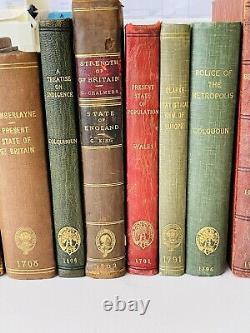
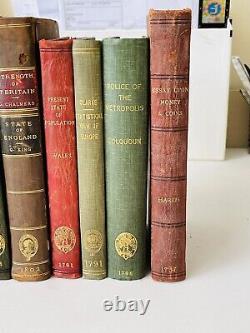
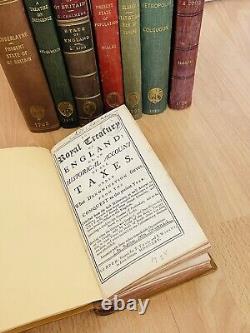
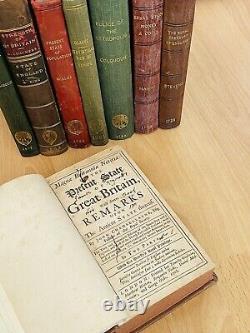
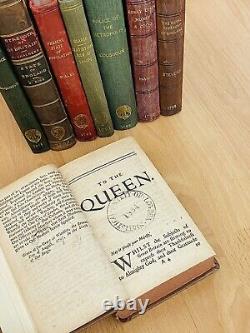
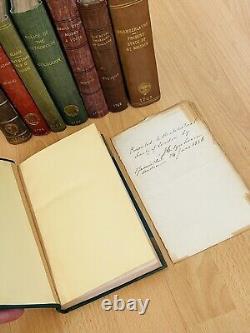
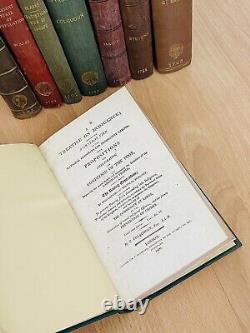
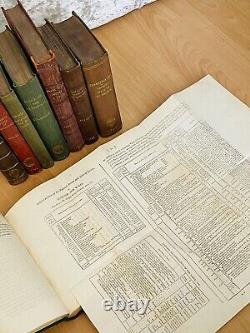
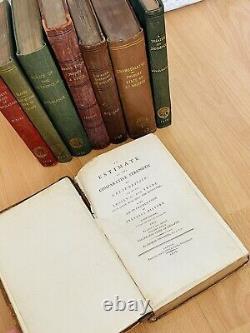
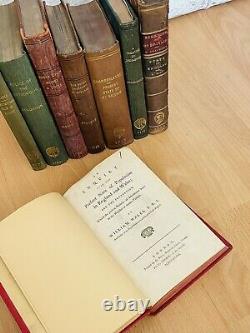
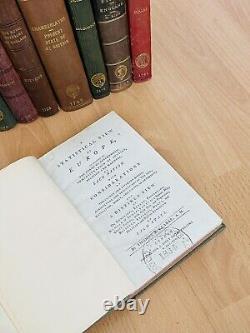
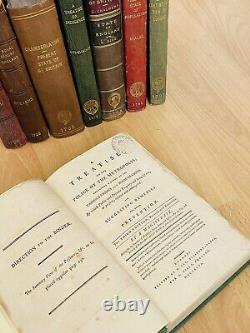
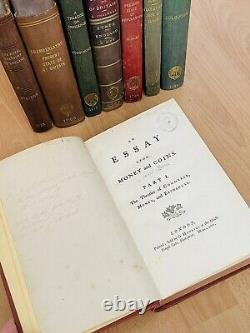


An incredibly fascinating and important set of 8 antique "working copies" from the ROYAL STATISTICAL SOCIETY. Used for their own fellows purposes as an aid to their critical research, this adds to the rich history of the books.
Subjects include demographics, population, poverty, royalty and politics of the time. Typically re-bound in their own covers, with beautiful spine and gilt stamps. They are also listed individually, so the price includes a discount for the set. Please message me to discuss condition, or for further information. Pages are clean and bright, binding is tight. 1781 - An Inquiry into the Present State of the Population in England and Wales. This copy rarely comes up for sale. Wales, a mathematician and astronomer, sailed with Cook on his second and third voyages. Despite encountering strong opposition to his enquiries, he demonstrated that the population of England and Wales was increasing. This was contrary to Dr. Seminal work on economics, finance and monetary theory. Joseph Harris (1704-64) was equally distinguished as an astronomer and as an expert on coinage. From a humble background, he came to the attention of Edmond Halley, the Astronomer Royal. He spent some time making astronomical observations in South America and the West Indies, and familiarised himself with marine navigational practice, proposing improvements to measuring equipment and publishing a very popular instructional work on the uses of globes and orreries.He later observed the 1761 transit of Venus from Wales. Harris entered the Royal Mint in 1736, and became the King's Assay Master in 1749.
This influential 1757 work, considered by the Victorian economist J. 1806 - TREATISE ON INDIGENCE. There is also an interesting inscription at the front of the book (page detached): Presented to the Statistical Society of London by'J Colquhoun' (son of Author). St James's Place London 1834.
Seminal work on poverty and pauperism, in which Colquhoun notably drew a line of distinction between poverty and'indigence'. In this book, Colquhoun provides a comprehensive examination of the effects of poverty and indigence on society and outlines the resources available to combat them.
Written in the late 18th century, this book remains a seminal work in the field of social welfare. Patrick Colquhoun was a Scottish merchant, statistician and magistrate who was responsible for founding the first regular preventative police force in England, known as Thames River Police. His work is credit as an important precursor to the'new' police founded by Robert Peel. Colquhoun published twenty four different treatise regarding a variety of social issues and concerns, with this work'A Treatise on Indigence' being one of the most significant. The work details the social issues of poverty and pauperism in relation to crime, with accompanying advice and information regarding his suggested solution to each issue. An influential treatise written by an important figure in police reformation. 1791 - A statistical view of Europe, in respect to the forms of government, administration of justice, religion and manners, of each nation. Clarke was a leading cleric and author, and wrote a series of technical guides to populations and relative demographics across UK/Europe. A graduate of Trinity College, Dublin, held livings in Ireland in which he was non-resident. Clarke was appointed Auditor of the Naval Asylum at Greenwich, which position he held from 1805 to 1821. His appointment and those of the Secretary and Chaplain were later criticized by Sir Charles Pole q.In the House of Commons on the grounds that none of them had ever had any sea service. The scarce first edition of this history of taxation in England from the Norman conquest to the first part of the eighteenth century, compiled from contemporary sources and manuscripts.
A fascinating history of royal taxation and expenditure from 1066 to the early 18th century. Highly regarded upon publication, it was a standard work for many years.
Stevens examines such income sources as feudal pledges and penalties imposed on conquered enemies and such expenses as defense, maintenance of the royal household and the suppression of heresy. The is a scarce first edition of Captain John Stevens' historical account of the history of taxation in England. Stevens, a respected translator, is best known for his 1700 translation of Cervantes''Don Quixote'.
Compiled from the work of historians'antient and modern', manuscripts held in the Cotton library, and a variety of other sources, Stevens discusses'impositions laid on the people... By virtue of the king's prerogative', and a more general history of taxation from the Norman Conquest to the time of publications. 1796 - TREATISE ON POLICE OF THE METROPOLIS. A Treatise on the Police of the Metropolis; Containing a Detail of the Various Crimes and Misdemeanors by which Public and Private Property and Security are, at Present, Injured and Endangered: and Suggesting Remedies for their Prevention. Patrick Colquhoun's interesting work regarding the London police towards the end of the 18th century. Revised and expanded over six editions in Colquhoun's lifetime. A second and third edition appeared in the same year as the first. Published anonymously, "By a Magistrate".Colquhoun's name only appears on the title-page of the fifth edition. This early edition only located in the British Library. A Treatise on the Police of the Metropolis' discusses in-depth of the police in London at the end of the eighteenth century. At this time, there wasn't a police force as we know them today. Instead, law enforcement was organised by local communities, with the government having no involvement in the policing.
The first professional police was the City of Glasgow Police, which was established in 1800. For that reason, this is a very interesting work, to see how law enforcement was developed before the establishment of the modern police force. 1708 - Magna Britannia Notitia, or The Present State of Great Britain with diverse remarks upon the ancient state thereof. Social and political conditions of England, with a list of officers and statistics.
On climate, air, soil, commodities, religion and trade in England. A large description of Scotland in general.
A large section of lists of Offices and Officers employed in His Majesty's Government in South and North Britain. He was a younger son of Edward Chamberlayne and his wife Susannah Clifford. In 1685 he entered Trinity College, Oxford as a commoner.Leaving Oxford without a degree, he proceeded to the University of Leyden, where on 12 May 1688 he entered himself as a student. Here, it would seem, he chiefly studied modern languages, of which, according to contemporary report, he knew sixteen. On his return he filled various offices about the court.
He was successively gentleman waiter to Prince George of Denmark, gentleman of the Privy Chamber first to Queen Anne and then to King George I. He was also secretary to Queen Anne's Bounty Commission, and on the commission of the peace for Middlesex. In 1702 Chamberlayne was elected a fellow of the Royal Society. Chamberlayne died at his house in Petty-France (now York Street), Westminster on 2 November 1723, and on 6 November was interred in the family burying-ground at Chelsea, where he had a residence, and where on his church wall a tablet was placed to his memory.
Chamberlayne's major work was his translation of Gerard Brandt's History of the Reformation in the Low Countries, 4 vols. In the preface to a part of this, published in 1719, he relates that Gaspar Fagel assured Gilbert Burnet "that it was worth his while to learn Dutch, only for the pleasure of reading Brandt's History of the Reformation". Chamberlayne also continued his father's Present State of England after his death in 1703, and issued five editions. The son's name still appeared on editions that were published after his own death (as late as 1756). 1802 - An Estimate of the Comparative Strength of Great Britain; and of the Losses of Trade from Every War since the Revolution; with an Introduction of Previous History. A New Edition, corrected and continued to 1801. To which is now annexed Gregory King's celebrated State of England. CHALMERS, George & Gregory King.The scarce enlarged second edition. An important economic study of Great Britain first published in 1782.

